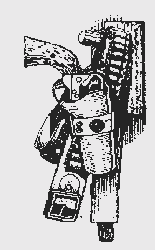
|
Astratigos' Kolimbari, Chania, Crete 73-006 Greece
|

|
Astratigos' Kolimbari, Chania, Crete 73-006 Greece
|
| 3rd, November, 1996. Dear Allan, Hilary and Sarah, The majority of the grape harvest goes to the local co-op, who turn the grapes into wine and the dry remains of skins and stalks into fertilizer. All keep back a proportion for their own use, some as fruit for eating but the bulk for treading in the old fashioned way and turning into their own wine, barreled in their own oak casks. The remains of the treading
are immediately placed in 45 gallon ex-oil drums lined with inert plastic sheeting, a pipe pushed into the centre and the plastic sealed around the neck of this. The drums are then left to ferment in the sun for 3/4 weeks and then transferred to the village still to become Tsikouthia - 'Rakis'. Each village can have a licence for one still so it is quite legal and the result, although differing a little
with each persons crop, is a properly distilled spirit. It is used as an aperitif, commonly offered to greet visitors, often accompanied by small cakes, chocolates or nuts of various types. This area is famed for it's almonds, which really are superb and offered sometimes in locally produced honey along with the Tsikouthia. A honey coated almond on a spoon.... A sip of Tsikouthia.... Many a
tourist has lost a day or so in a Cretan village. |
| It is also a matter of some concern to me that out host was over eighty years old and obviously well able to cope whilst I am in my early fifty's and was equally obviously unable to do so. I have never ceased to be amazed that these same people are often up and working by 6 or 7am - more often than not smiling and wishing me good morning when I appear 3 hours
or so later than them. Such hospitality is the rule rather than the exception, and even in villages where you are not known, if you stop to talk or eat it would be unusual if you were not offered some aspect of it. Before we came to live in Crete we spent some of our holidays here for six years. At first we started in Akrotiri in a holiday apartment. We knew no
Greek and the local villages spoke little English, some still don't, in spite of the increase in tourism by English speakers in that area. It is a measure of Cretan hospitality that we are still remembered and welcomed by people we met on out first holiday, although we now live nowhere near there. |
| Some of the holidays were hilarious. Our second, again to Akrotiri, contained the saga of the watermelon. Karpouzi, as this dubious delicacy is known, is rampant during the season. Prices fall as the size of the individual melons increases - and everyone delights in giving huge portions to everyone else at the slightest excuse, often at the end of a meal when you are already over and couldn't eat another morsel.... Well, you could if the alternative is insulting someone. The problem is that to avoid doing so you must show appreciation of the Karpouzi, which will instantly result in another portion. I have a photograph of Pam, Nicola and a young escort taken at a restaurant after a meal to celebrate one of Pam's birthdays. They are gazing dumbstruck at a | 
|
| huge platter of watermelon in a manner oblivious to all but the mountainous platter the waiter had designed to top the evenings celebration. After the event the waiter insisted on driving everyone to the local beach-bar where the direct from Huddersfield barman, on learning of Pam's birthday, presented her with a huge watermelon cocktail, free.... As if
to retaliate at our obvious aversion, a gigantic half-melon given to us next day by a good Cretan friend, upon being placed on a glass shelf in the refrigerator, smashed its way through to the lower shelf as the door closed, creating the most magnificent watermelon omelette with the eggs on the lower shelf. On another occasion, after being taken as guests to a feasting at the village of Ravdouha, which is another story, we were accepted with great hospitality and enthusiasm by the locals, literally swamped with food and wine to the point of being unable to consume any more, only to be told that we were all then going to the taverna for supper. It was only then, in the fifty-somethingth year of my life that I understood the meaning of a "wan smile" and "Cretan hospitality." Hysteria seemed not far removed from a "wan smile" when we remembered that immediately before the feasting an elderly lady bearing an enormous bunch of grapes in each hand had appeared at our door, spoken several sentences of very rapid Greek, and looked inquiringly at us. Speaking only English but being good at body language, I explained to my wife that the elderly lady meant us to take them to the feasting - there were certainly enough for several people and we were leaving next day. Our guide to the feasting knew of the gift because when he arrived and heard my explanation he said "oh no, Katina told me about the grapes - they are for you! Treading them in the shower was out of the question, as was leaving them behind. They were for us to take to England and Katina was to be amongst those who wished us "Kalo Taxithi". The grapes had better be there too............ Today is a Saturday. Being the "other" in "every other" Saturday the beer man comes. Stellios is one of the numerous mobile distributors of beer, water and soft drinks in the area. A bit like "Davenport's Beer at Home" of 1960's England, albeit Cretan mountain village style in this case. He drives an ancient lorry loaded with
the said Pota around the villages supplying both populace and tavernas. For me he is god-sent. Until my neighbour Michaelis finally cracked my language barrier, I was hauling my own from the supermarket 1000 feet below at a greater price. Now I only have to haul it from the village square to our house. Stellios took an immediate shine to us when, because of language difficulties at first and
reasons unknown to myself, I called a crate of Amstel beer "Cretan Water" and asked for two. As Greek improved I was made greatly aware - amid raucous laughter - that I had agreed that the case of water I had purchased at the same time was really beer. A tale of infamy that has even reached Kolimbari, a village where they may be British tourists to hear and carry the tale home....... |

|
Niki , Zacharenia's daughter-in-law had shortly before decided to steal Pam, who was to accompany her and her children, Michaelis and Zaxaroula, to move Manoli's Gaitheros (donkey) to a different field down the road. Manolis is in Athens. He is not family, but he is a villager, his property will be watched and his mule looked after while he is away. I say mule and not donkey because that's what it is. This is no Blackpool beast, but a fully fledged and rather splendid mule. When she got back, Pam said that little Michaelis - three feet tall at best - had done most of the hauling of the beast to its new pasture. Manolis usually rides it to the kafenion in a neighbouring village, Rodopos, for a little social chat over a Tsikouthia. |
| Rodopos is quite a rich village. though there is only mountain beyond it's main street, which itself is only a tiny road leading from a large village square. There are four tavernas here. One for the young, one for the middle aged, one for the old and one which doesn't seem to be for anyone. The village played a very active part in the battle for
Crete in WWII. The Germans are well remembered - even though they are treated civilly if touring. When we first came here we were continually asked if we were German and it was only after a year or so that we were established unquestionably as English. Shortly after that, we were stopped in the street by an elderly gentleman who wanted to shake hands and ask me how many Germans I had killed in the
war. When I told him none, I had been too young to fight, he questioned my answer, pointing out that I had grey hair. However, learning that my father had been in the army put things right - he must have killed some. Living here is a bit different. Like Macclesfield, my part of it anyway, 1953. People live in communities, they look on their neighbours as such and it is not unusual to have them visit, if only to see for themselves how you are. A visit is often accompanied by a gift - usually food or wine, and in the last year, we have received quite a large amount of fresh vegetables and fish, chickens and even a rabbit - the latter two already prepared for cooking. These cannot be refused, which makes it a little difficult because Cretans cannot be repaid. If you attempt to reciprocate is is taken as an insult. Our neighbour Michaelis insists that our olive oil - expensive even here - comes from him, free. it if he thinks we are buying it, he checks our container. We are talking five litres at a time of extra virgin olive oil. If it is too full, we are guilty, if it is not too full, we are replenished. He recently sent his wife to check, she asked Pam where she had bought the oil (there was too much by her calculations) and how much it had cost. The container was emptied into bottles, and another five litres delivered - plus a bottle of wine (Sherry really). We respond by occasional lifts, but even that is only occasional with the exception of the trip to Kastelli. Kastelli is a small seaside town about 10 miles away. En-route lies a small concrete building by the side of the road. This is a combined eating spot/butchers run by family friends of Michaelis. He likes to visit. We can do no wrong there either. The meat is the best we have obtained anywhere and no more expensive than lower quality (though poor meat is very rare here) in the average butchers. There is also a bonus, or drawback, depending on your point of view. When we visit, we usually have breakfast - sausages (not the English variety), chicken, perhaps pork and a few beers, sat in the sunshine watching the tourist cars go by, and the company is excellent. The problem is paying for it. There is a constant battle between the Cretan entourage about who is paying for the food and drink, the butcher or Michaelis. We are not considered qualified to enter the argument, which is, of course, very good humoured but also very determined. Pam gave a fly paper (Macclesfield '53) to a neighbour (Katina) this morning. Katina asked how much it was. Pam said it was nothing - she had stolen it from the shop and run away with it (women!). katina asked how much it was. Pam said nothing. Katina came to me half an hour later and gave me a litre and a half of her best red wine. She didn't mention my kleptomaniac wife! However the last time I drank Katina's best red wine was one evening on our balcony. I awoke with a very bright light shining in my eyes, which turned out to be the next day's sunrise, but that's another story too. It is a good life here, as I write I am listening to sheep and their newborn lambs nearby. The weather is unkind in some ways with a lot of rain now, squalls of the sea-made type - horizontal and very cold, but perhaps incongruously very good for the olives, which are good for the people. We have never regretted a minute of our retirement here. Well, enough for now. There is much to do here and sometimes not enough time to do everything we want to do ourselves. The house has some way to go and is a story on its own, though we are enjoying every minute and have plans to buy an adjacent ruined building from our neighbour, if we can agree a price, to extend our garden or perhaps a couple of rooms eventually. Barbara, Roy and Eileen are well known and popular. Roy, I think, has now managed to live down his Tsikouthia drinking competition with Michaelis' son a couple of years back. It cost Roy a couple of days of not feeling well and set the scene for a return bout, which some of the younger men sought last year. Fortunately, Roy had Michaelis' (necessary) protection, although he probably didn't realise it. His performance this year was exemplary, and his standing reinstated! We had originally planned rather more activity than was possible this year and the early break in the weather meant the necessity to start preparing the house for winter - The Cat and The Fiddle has nothing on this mountain when it rains. Last night it snowed on the Omalos range - about 20 Km. east and a few thousand feet above us. Beautiful in the sunlight but not nice at the time. |
| Your letter was very welcome. Retirement is different for everyone I am sure, but Pam and I have been getting far more out of life since finishing work, although we have been too busy to notice the difference! We send our best wishes to Hilary and Sarah - we hope that Sarah is settling into her new school - she has a very bright future we
think. Tell her to make the most of the present too, that way she wins twice! Well, I will close now - hope that you are all well and have some idea about our village. There is so much more to Crete, indeed the islands as a group, to tell and to see. Perhaps we can talk about them in person. You are welcome at any time, and of course to the use of the house if we are away. See you soon. Wilf and Pam |

|
| Because this is the first letter on the site the archive link is not yet active. New letters will be added here and older letters will be placed in the archive and the link activated to enable retrieval. We hope that you have enjoyed the letter above, will come back to read more and maybe one day read the book! You are very welcome. |